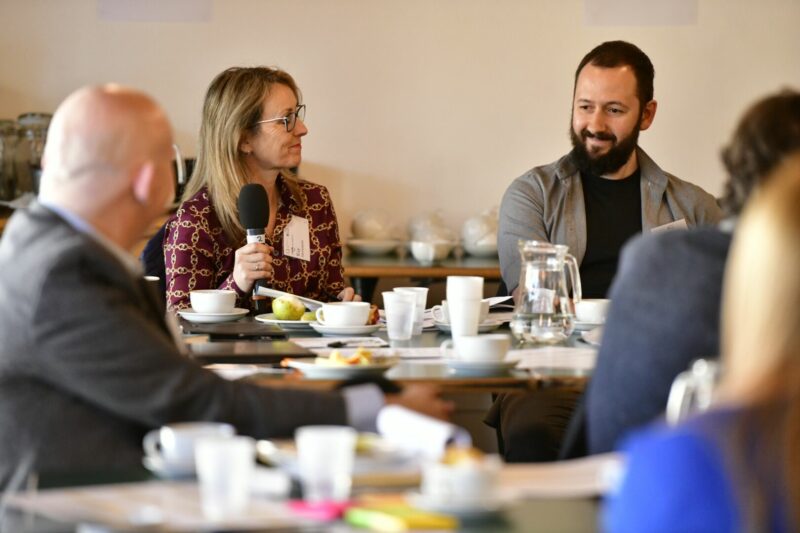As mentioned in my last blog, since September the Q Lab and Mind have been working with almost 100 Lab participants to explore how care can be improved for people with mental health problems and persistent back and neck pain.
After four months of sense-making; undertaking both desk-based research and hearing the stories and experiences of people with lived experience, and practitioners, we are now starting the next phase of work: developing and testing ideas.
Working with four organisations (test teams) over the next 6 months, it is an exciting opportunity to apply what has been learned through the collaborative research and to turn it into practical actions to improve care and services.

The roles you can play
Like Q, collaboration is at the heart of the Q Lab. As test teams develop and iterate their ideas, they will need to draw on the collective knowledge and networks of the Lab and Q communities. What role can you play to support your fellow Q members over the next six months?
Maybe you are an expert and can bring professional or lived experience of mental health problems and persistent pain. If your talent is giving feedback then you could be an invaluable critical friend, providing challenge and support to test teams. Those who are well connected could perhaps act as champions, helping to share the learning and findings from the testing to influence others. Or finally, you might just be keen to learn and apply that learning to your own work.
Bear these roles in mind when reading more below about who the test teams are and what they hope to achieve over the next 6 months.
Health Innovation Network
About: The Health Innovation Network (HiN) are an Academic Health Science Network who work across 12 boroughs in South London.
Working in partnership with St George’s Hospital and Kingston Hospital, HiN want to explore how mental health can be embedded within existing pain management programmes, and improve service and referral pathways based on a better understanding of the needs of people living with mental health problems. HiN are also keen to improve their Joint Pain Adviser (JPA) programme, which supports people to manage knee, hip and/or back pain through education and exercise.
Areas of exploration and ideas:
- How can the current successful pain management approaches be adapted to support people with mental health problems?
- How can people who are in distress due to persistent pain (which may mask an underlying and undiagnosed mental health problem) be better supported?
- How can non-specialist professionals be up-skilled to talk about MSK health and mental health?
Do you have experience of these topics to share with HiN? Connect with Amy Semple
Powys Teaching Health Board
About: Powys Teaching Health board is a rural health board based in Wales, providing services for a large rural population. Powys follows a biopsychosocial approach (an approach which considers biological, psychological, and social factors) to managing pain and fatigue. The Powys team support people who have difficulty accessing pain education due to symptoms of their condition, logistics of travel or taking time off work.
Areas of exploration and ideas:
- How can people be supported to sustain change when things happen in their life?
- How can consistent pain education be delivered in rural county where transport and access is challenging?
- How can people be better engaged in the shared decision-making process?
Do you have expertise or experience of shared decision-making you can share with Powys? Connect with Owen Hughes and Clare Clark
The Robert Jones & Agnes Hunt Orthopaedic Hospital
About: The Robert Jones & Agnes Hunt Orthopaedic Hospital is a specialist secondary care setting focused on physical health.
Areas of exploration and ideas:
- How can clinicians be better supported to provide more holistic care?
- How can we best integrate models of care?
- How can others be convinced to go on this journey with us and how can this influence the national picture?
- How can mental health be more prominent in physical health and vice versa?
Do you know of other mental health and physical services that have integrated, to share with Robert Jones and Agnes Hunt? Connect with Kerry Robinson
Keele University and Midlands Partnerships NHS Trust
About: The Keele team will explore how Haywood Hospital in Stoke-On-Trent can support the high proportion of patients who present in MSK-focused settings with both musculoskeletal pain and anxiety and depression.
Areas of exploration and ideas:
- How can effective spaces be created that bring together people with lived experience to explore and co-produce materials for patients, the public and clinicians?
- What does great training look like for mixed groups of patients, the public and clinicians to improve awareness of mental health issues?
- How can this learning be embedded into clinical consultations for those with neck and back pain within existing services?
Have you got useful learning on co-production to share with Keele? Connect with Kay Stevenson
How to get involved and next steps
Do you have experience in the areas of work described by the test teams? Or perhaps one of the question sparked an idea, or learning that you’d be happy to share. If so, get in touch with us QLab@health.org.uk and we can make the connection.
I’d also encourage you to join the online group where the test teams will be sharing some of their learning and experiences, as well as posing questions to the Q community.
Comments
Dacia 2 Jun 2019
This post provides clear idea in favor of the
new users of blogging, that in fact how to do blogging.카지노